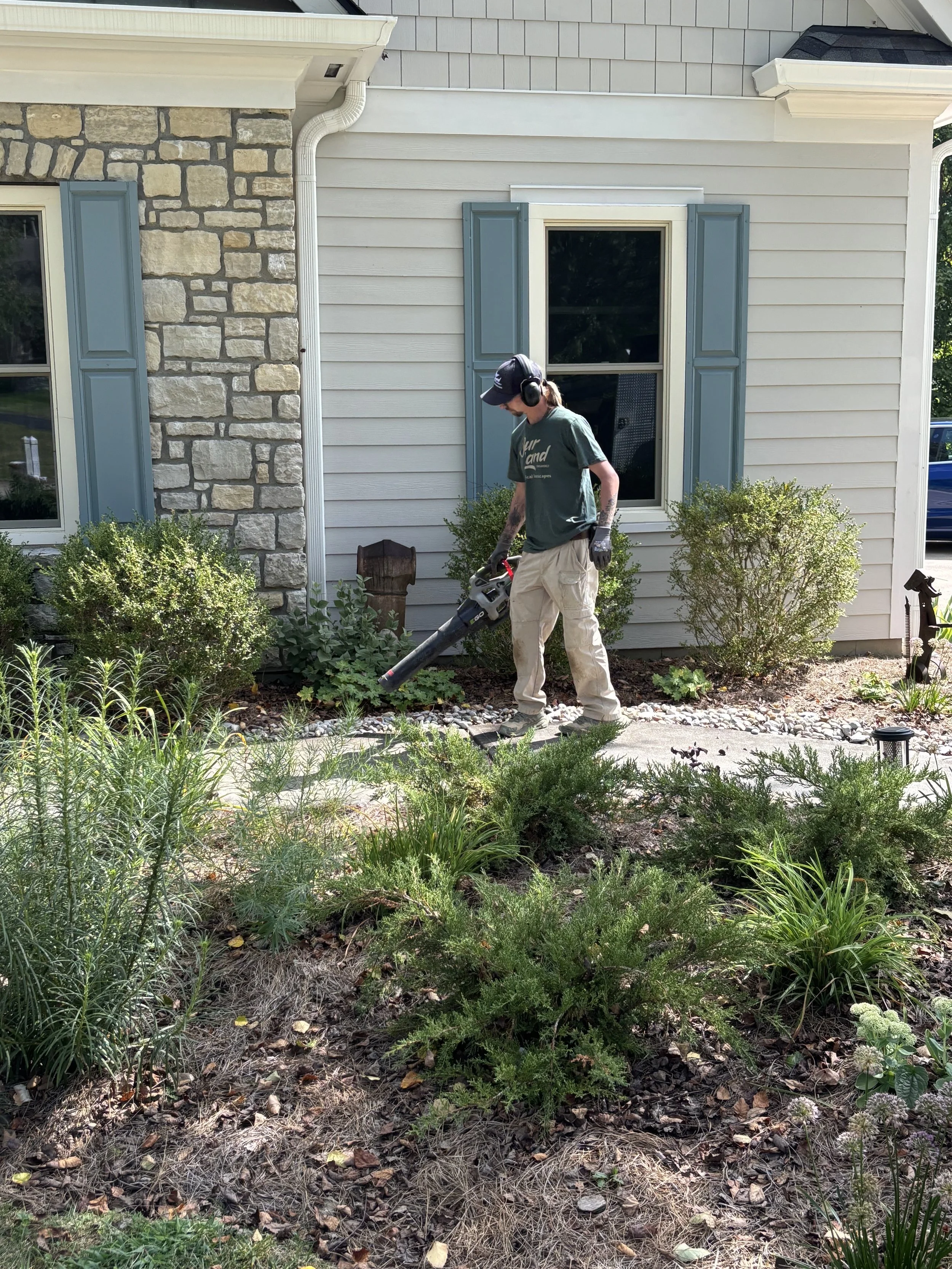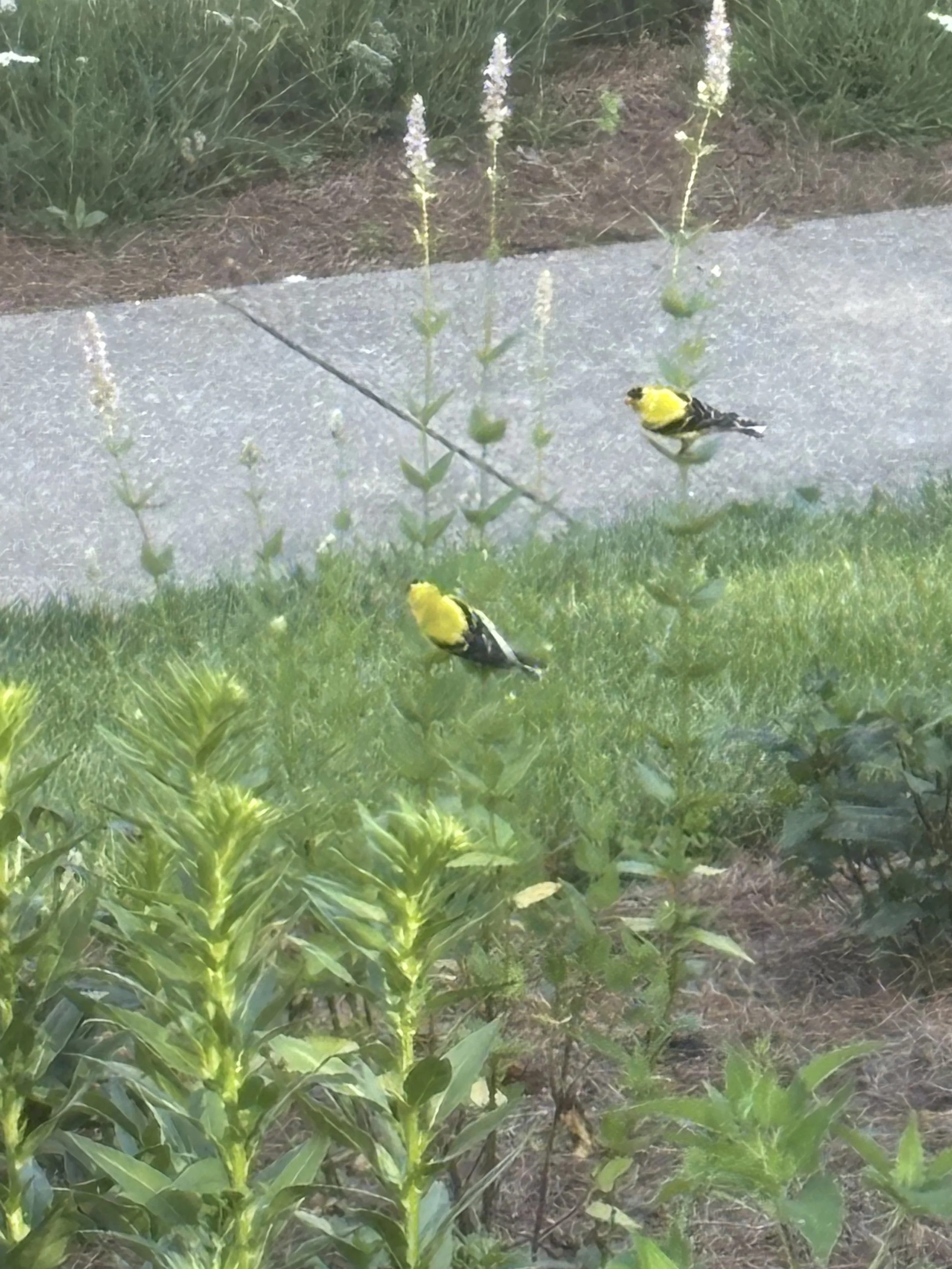Our Land Organics invested in electric equipment right from the start, stocking our garage with rechargeable mowers, blowers, chain saws, string trimmers, and power shears.
We put a lot of thought into this decision, and we think it offers several benefits. Here, we delve into some of the reasons why we love electric equipment.
An Our Land Organics team member using an electric leaf blower during an organic land care visit
Fewer Emissions
A huge part of our mission is to create and care for natural environments and to do so mindfully so as to minimize our impact on those environments.
In pursuit of this mission, we follow strict Organic Guidelines set out by the Northeast Organic Farming Association (NOFA) to ensure that our work is not negatively impacting native plants, insects, or wildlife.
Put simply, there is no squaring our commitment to land stewardship with a reliance on gas-powered equipment.
Two-cycle engines are very inefficient, spewing particulate matter into the air, clogging our ozone with CO2, and creating smog in our cities. One study, reported from the Environmental America Research and Policy Center, concluded that “operating a commercial lawn mower for just one hour produces as much smog-forming pollution as driving 300 miles in a car.”
Comparatively, electric lawn tools are the clear winner.
Another report published in the International Journal of Life-Cycle Assessment found that “residential electric push mowers produce 49.9% fewer carbon dioxide emissions over their lifetime than gasoline-powered versions.”
Better Air Quality
Aside from the fossil fuels required to actually operate gas-powered lawn equipment, these inefficient tools emit a number of pollutants into the air.
If you’ve been in the Cincinnati area in recent years, you know we experience far more Air Quality alerts during the summer months. This is due, in part, to the number of lawn mowers, leaf blowers, and string trimmers being operated during those months.
This problem is compounded when you consider the excessive use of blowers dispersing dirt, pollen, fertilizer, and pesticides into the atmosphere.
Enhanced Peace and Quiet
Gas-powered equipment is noisy, which is why, according to the Audubon Society, “more than 100 U.S. cities and towns now ban gas-powered leaf blowers or limit their use.”
You yourself probably have been outside enjoying a beautiful morning, only to be pushed inside by the noises of lawn maintenance.
Electric equipment minimizes our audible impact in the environments where we work—for our clients, their neighbors, and wildlife.
Two goldfinches enjoy some peace and quiet in an Our Land Organics native pollinator garden
Greater Well-being for Wildlife
Research suggests the excessive noises caused by gas-powered lawn equipment are actually harming wildlife.
According to an article published by AP News, excessive noise disrupts birds’ ability to mate and avoid predators. Leaf blowers and mowers also can be deeply disorienting to bats.
Minimizing our auditory presence is an act of care for the wildlife who are supported by the habitats we create through native landscape design.
The Takeaway
It’s hard to be a pollinator in the world we have created, and the unfortunate truth is that many well-intentioned people may be making things harder. This is why we try to be intentional with our processes and choices, always allowing our mission and values to guide our decision-making.
Through our ecological design and installation work, we are trying to restore and create pollinator habitat that has been lost to large-scale development. Through our organic landscape maintenance work, we are committed to keeping established landscapes looking beautiful without the use of toxic chemicals and habitat-destroying practices.
The tools we use are another important piece of the puzzle. If you’re still relying on a gas-powered machine in your yard, consider making the switch when the time is right. We did it a long time ago and are very happy with our decision!
References:
grist.org/technology/lawn-equipment-pollution-report/
publicinterestnetwork.org/wp-content/uploads/2023/10/Lawn_Care_Goes_Electric_Oct23.pdf
apnews.com/article/gardening-noise-leaf-blowers-2ad677df9e1d3b06b8bfa692a783a554
www.audubon.org/magazine/why-cities-are-taking-action-limit-loud-polluting-lawn-care
psci.princeton.edu/tips/2020/5/11/law-maintenance-and-climate-change



